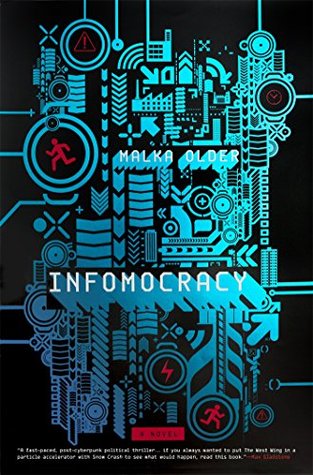More on this book
Community
Kindle Notes & Highlights
The sign on the defunct pachinko parlor proclaims 21ST CENTURY, but the style—kanji in neon outlined in individual light bulbs? Who does that?—suggests it was named at a time when that was a bold look toward the future, not a statement of fact that has been accurate for more than sixty years.
Every centenal, every collection of one hundred thousand neighbors, matters, whether it is spread over hundreds of miles in the tundra or crammed into a couple of overdeveloped blocks in Dhaka.
The whole point of micro-democracy was to allow people to choose their government wherever they were, but plenty of people didn’t agree with their 99,999 geographically closest friends. Some areas—Ireland being one classic example, vast zones of what used to be the United States another—had been polarized so deeply and so long that your choices if you stayed were pretty much A or B.
Opening the borders (such borders as remained, anyway) allowed the new governments to pull in more like-minded people, consolidating their holds on their centenals for the next election and stretching into neighboring ones as populations surged. Some journalist two decades ago dubbed the process mandergerrying, although it is also known as reverse osmosis, because it results in greater concentrations of like-minded—and, on occasion, racially or ethnically alike—constituents.
“Systems include their by-products; it all comes from the pattern of incentives they create. It’s how they make people think, how they make people behave.”
“The fact that you’re antielection just tells us that wherever you lived before it started, you were privileged.
you can give a voter Information, but you can’t make him think.”
The new Heritage coalition of wealthy, experienced global corporates ignored the accessibility of Information, produced their standard glossy misinformation, and not only took the Supermajority but won centenals where, analysts agreed, it was demonstrably not in the interests of the people living there to vote for them.
Information workers, with their ingrained culture prioritizing rigorous truth, struggled to slap motivational music or abstract video of stunning views and happy faces onto their datasets, and it showed.
“Twenty years isn’t that long,” Nougaz says. “Our job is to make sure Information and the centenal system survive long enough for those attitudes to disappear.”
Frustrated with the impossibility of getting people to make informed choices, stymied by the name-recognition problem and the celebrity factor and a million other quirks of neurobiology, the people who cared decided to manipulate the people who didn’t.
despite all the Information available, people tend to look at what they want to see.


